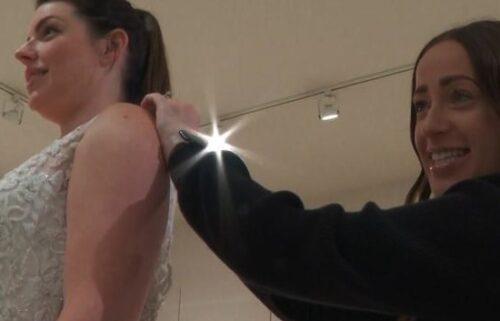Milwaukee is spending $88,000 on an art car. It broke a month after it was introduced.
By A.J. Bayatpour
Click here for updates on this story
MILWAUKEE (WDJT) — A city-funded truck adorned with decorations aimed at raising awareness of reckless driving is already out of service after being introduced last month.
The director of Milwaukee’s “Vision Zero” initiative, which aims to prevent traffic deaths from happening in the city, confirmed Friday “The Moving City,” which will cost the city an estimated $88,000, is down for repairs.
The art car was introduced to fanfare at Red Arrow Park on Aug. 14. The “Moving City” is a Ford Ranger taken from the Department of Public Works (DPW) and covered in traffic cones that were carved and painted. The truck was also branded with various expressions, such as “What’s happening in your mirrors?,” “Be the person you want to share the road with,” and “Take turns.”
Multiple sources at City Hall told CBS 58 this week the “Moving City” had broken down. Vision Zero Policy Director Jessica Wineberg confirmed in an email Friday afternoon the traffic awareness truck was out of service.
“The Moving City has a mechanical issue that is preventing it from being driven, currently,” Wineberg wrote. “Like all car owners know, vehicles need maintenance. We are lucky to have a team of experts that can fix fire trucks, street sweepers, and also The Moving City (which is really just a Ford Ranger). We are investigating the repair needed and do not know the cost yet.”
Ald. Lamont Westmoreland blasted the art car in an August 30 statement, calling it a “huge waste of money that won’t impact reckless driving.”
Westmoreland said he reached out to the DPW and Wineberg for answers earlier this week but did not get a response.
The northwest side alderman said he wasn’t available for an interview Friday, but he said over the phone it was his understanding the art car broke down because its suspension system couldn’t handle the weight of the art that had been welded onto it.
In a statement sent via text message Friday evening, Westmoreland said he wanted to know which city fund would end up paying for the repairs.
“The waste of $88,000 in taxpayer dollars has gone from bad to worse,” Westmoreland wrote. “‘The Moving City’ is now broken and, actually, not moving at all. For now, I’ve branded it ‘The Non-Moving City.’ I’ve asked who’s responsible for the repairs, no one has bothered to respond.”
Ald. Jonathan Brostoff, who was at the August 14 unveiling, said Friday he hadn’t heard about the art car’s misfortune.
A CBS 58 crew went to the city’s Central Repair Garage in the Menomonee Valley but didn’t see the art car on the lot. A man who identified himself as a repairs manager said the garage hadn’t taken in the “Moving City” for repairs, and the last time it was in the central garage was when city welders attached art fixtures to the truck.
Wineberg said she did not have any additional details when a reporter followed up to ask if the weight of the art caused the mechanical issue.
Last month, Westmoreland shared with media a breakdown of costs associated with the “Moving City.” An “artist consultant stipend” had a price tag of $43,000 according to a memo provided by the city’s Legislative Reference Bureau.
Project costs, such as materials and subcontractor work, added $25,000 to the final cost. There was also a $20,000 “liaison stipend,” which brought the final anticipated price to $88,000.
The art car is mostly being funded by the Milwaukee Arts Board Public Art Fund. The board receives $25,000 each year from the city budget, and the board put forward a total of $93,000 between this year’s allotment and $68,000 in unspent dollars from past years.
The DPW is listed as having provided $5,000 as the host department according to the memo. However, Lakeside Plastics provided an in-kind donation of cones valued at that $5,000 figure, and the Ford Ranger came from the DPW tow lot.
As of August 29, then the memo was issued, the city had spent a total of about $62,000. That number included artist hours billed as of February 1. The city was waiting on the final number of billable hours worked between then and June 30, when the artist in residence program ended.
Please note: This content carries a strict local market embargo. If you share the same market as the contributor of this article, you may not use it on any platform.


